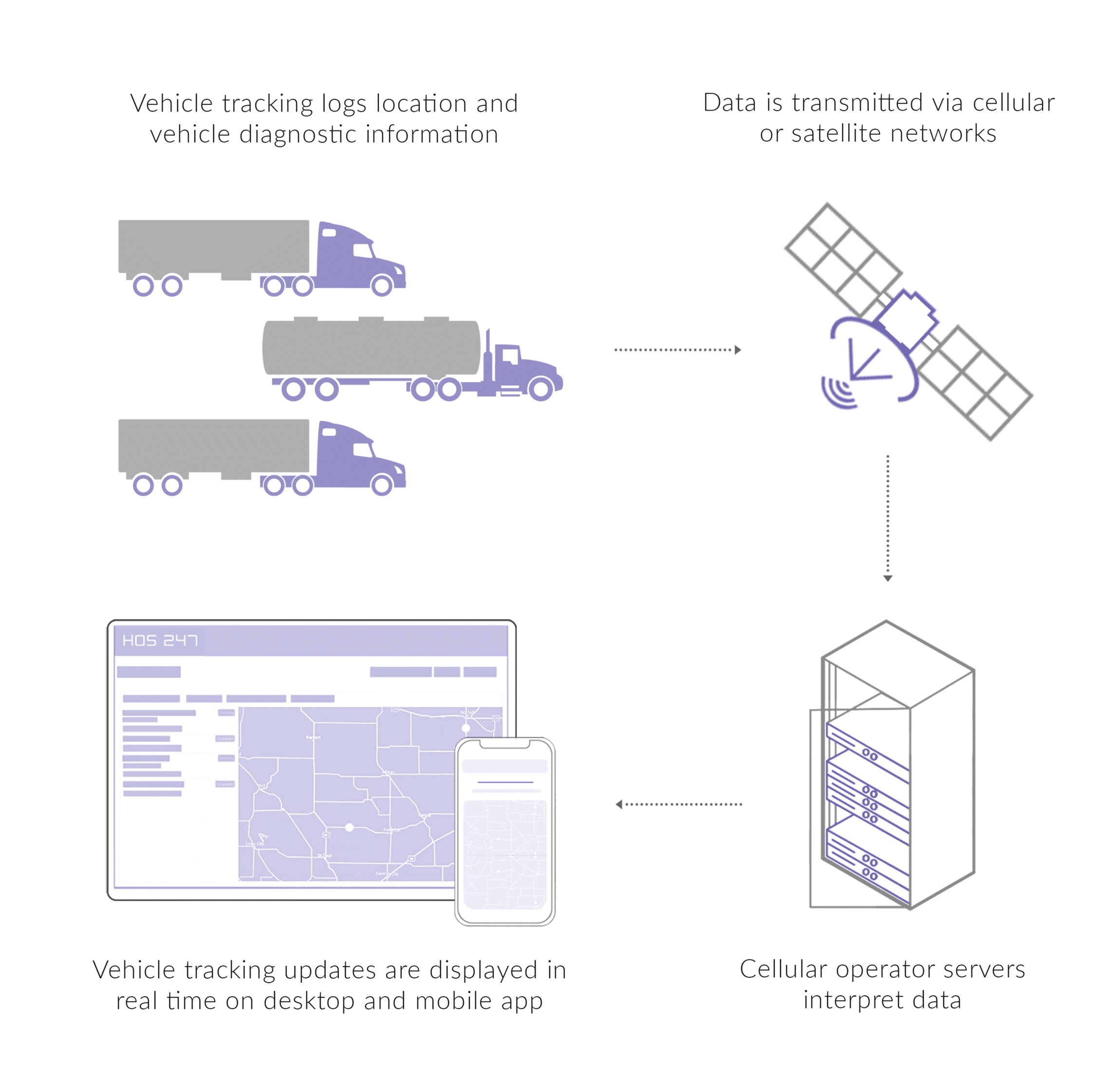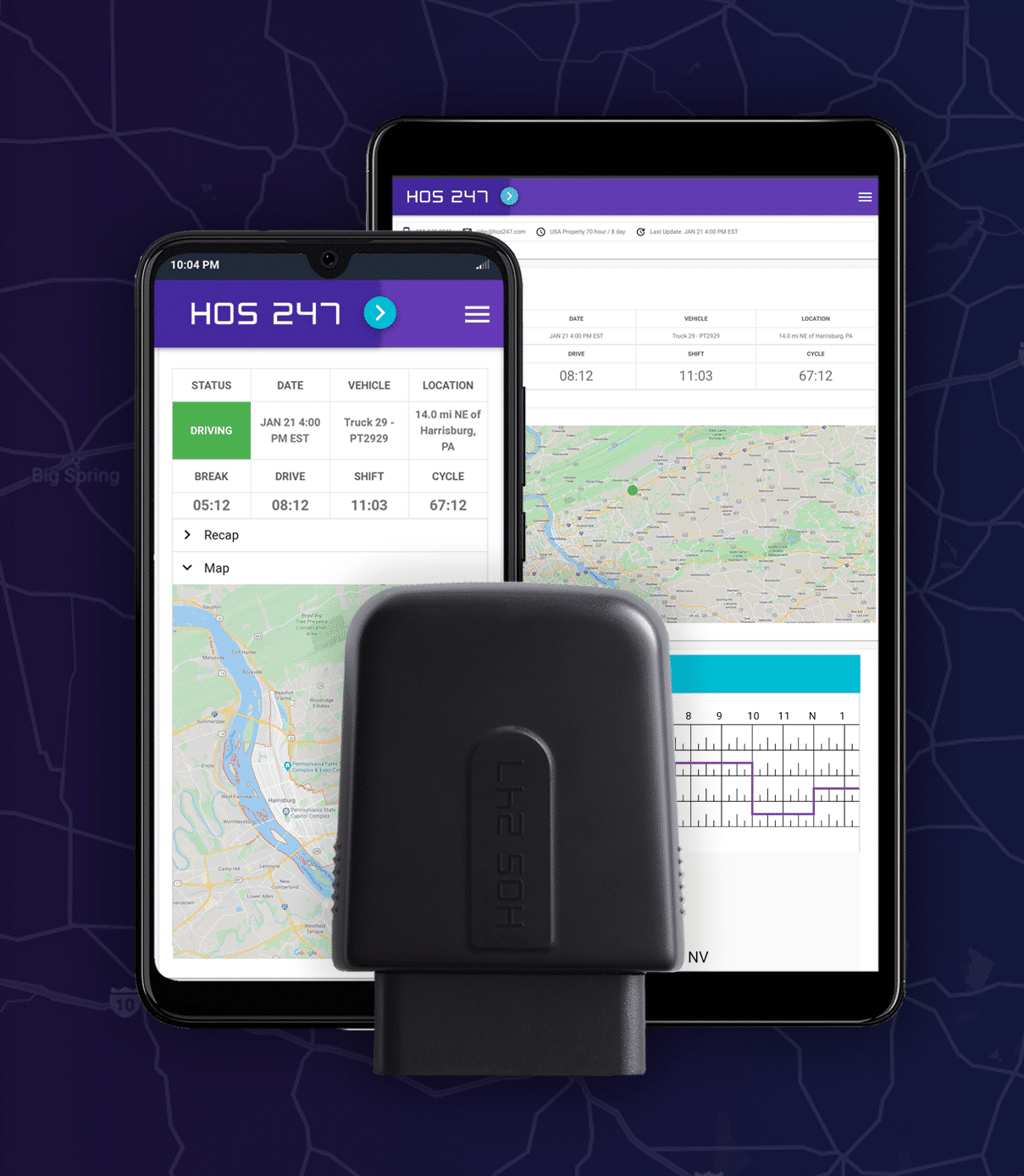When it comes to the trucking business, visibility of operations can be a valuable tool to increase efficiency. In addition to improving safety, cargo trailer GPS trackers contribute to considerable savings and optimized workflows. Real-time tracking offers transparency, enabling fleet managers to reduce costs related to fuel wastage and vehicle maintenance, as well as encouraging better driving performance. In this article, we’ll discuss the benefits of fleet tracking, compare different tracker options, and provide guidance on choosing a reliable system for your business.
Do you have any questions? Talk to ELD Advisor: 650-405-3372 or Request Callback
How Does GPS Tracking Work?
GPS trackers utilize GPS (Global Positioning System) technology to determine the precise location of the trailer at any given time. This location data is then transmitted through cellular networks to a central server or platform. Fleet managers or operators can access this information through a web-based portal or mobile application. Armed with this valuable information, fleet managers can pinpoint areas for improvement and unlock new levels of operational productivity.
While it is true that all tracking systems operate on a similar principle, the quality of service can vary significantly depending on the tracker you choose. In the upcoming section, we will introduce our reliable tracking solution, designed to help truckers grow their business.

Benefits of HOS247 4G GPS Cargo Trailer Track System
HOS247’s tracking services are highly valued in the transportation industry for their reliability and customer-friendly policies. Our tracking solutions use 4G connectivity to provide fast and uninterrupted data transfer for precise vehicle monitoring. By choosing HOS247, motor carriers can reduce costs on nearly every vehicle-related expense. Let’s explore the advantages offered by trailer tracking:
- Enhanced cost savings. Implementing the HOS247 cargo trailer tracking system can yield significant operational cost reductions. By monitoring driver behavior in real-time through a user-friendly web-based portal, fleet managers can identify and address fuel wastage and careless driving patterns promptly, leading to reduced operational expenses.
- Heightened safety and security. Our discreet trackers offer an additional layer of protection for your fleet, ensuring swift recovery in the event of theft. Moreover, HOS247’s vehicle maintenance tool enhances driver safety by ensuring compliance with FMCSA regulations and timely vehicle upkeep. Fleet managers receive notifications via the web-based portal regarding unauthorized vehicle usage or accidents, enabling them to take immediate action.
- Seamless installation. Our system is designed for effortless and straightforward installation. With no intricate wiring required, the hardware can be set up within minutes. Additionally, the software can be conveniently downloaded using any standard internet browser. Once the setup is complete, fleet managers can effortlessly log in and start utilizing the solution.
- Enhanced asset utilization. The system provides visibility on trailer utilization and helps identify underutilized assets for improved resource allocation
- Improved customer service. The visibility provided by the HOS247 GPS tracker greatly enhances dispatch efficiency. Real-time tracking empowers dispatchers to plan routes that circumvent traffic and construction, resulting in expedited asset delivery. The system facilitates effective task assignment by displaying which driver is closest to a specific site. Furthermore, our software collects valuable information regarding truck arrival and departure times, offering customers tangible proof of service.
Boosting Customer Satisfaction and Service with GPS Trackers
One of the standout advantages of GPS trackers is their ability to deliver prompt and accurate responses to customer inquiries. Through accurate estimated time of arrivals (ETAs), timely notifications of any unforeseen delays, and the ability to adjust delivery schedules in real-time, customer service representatives can provide timely updates on delivery status, ensuring customers are always well-informed and reassured.
This eliminates unnecessary follow-up calls and allows a smooth and hassle-free experience for all parties involved. Customers appreciate being kept informed throughout the entire process, which ultimately leads to higher satisfaction levels and strengthens long-term business relationships.
Moreover, trailer GPS trackers provide verifiable proof of service by recording precise arrival and departure times. This level of transparency instills confidence in customers and allows them to plan their logistics with accuracy. By leveraging this data, any potential delays or issues can be addressed proactively, effectively minimizing customer dissatisfaction.
By optimizing routes and leveraging real-time tracking capabilities, GPS trackers also help reduce errors and delays. Dispatchers can efficiently plan routes that avoid congested areas, road closures, or other obstacles, to achieve on-time deliveries. This proactive approach not only meets customers’ expectations but also enhances their overall experience, leaving a positive and lasting impression.
Experience the growth-driving benefits of integrating cargo trailer tracking systems into your business operations. The HOS247 solution delivers cost savings, heightened safety and security, straightforward installation, and improved customer service, empowering you to achieve optimal efficiency and elevate customer satisfaction.
Key Features to Consider in a GPS Tracker
When investing in GPS tracking technology for your cargo trailers, it’s essential to evaluate specific features that will deliver maximum value to your trucking operations. While basic location tracking is standard across most solutions, the following key features can significantly enhance the effectiveness and reliability of your tracking system.
Durability and Weather Resistance
Cargo trailers frequently operate in challenging environments, from scorching summer heat to freezing winter conditions. A high-quality GPS tracker must be engineered to withstand these extreme elements without compromising performance. Look for devices with robust weatherproof housing and quality components that can endure vibrations, moisture, dust, and temperature changes. HOS247 trackers are specifically designed to deliver continuous operation regardless of environmental challenges. This durability translates to fewer replacements and maintenance issues, protecting your investment and providing reliable tracking capabilities throughout all seasons.
Battery Life
For non-powered assets such as detached trailers, battery durability is a critical consideration. Advanced GPS trackers should offer extended battery life to minimize maintenance requirements and ensure continuous visibility of your assets. The best solutions provide intelligent power management features that adjust reporting frequency based on movement, saving power when trailers are stationary. When evaluating tracking systems, prioritize those offering battery lives measured in months rather than weeks, with easy-to-access battery status indicators through the management portal. Implementing trackers with superior battery performance reduces operational disruptions and ensures your valuable cargo remains monitored even during extended periods of inactivity.
Integration with Existing Systems
To maximize operational efficiency, your cargo trailer tracking solution should integrate with your current fleet management infrastructure. The ability to gather data from various sources—including electronic logging devices (ELDs), maintenance software, and routing systems—into a unified platform streamlines workflow and enhances decision-making capabilities. Integration eliminates the need to switch between multiple applications, reducing administrative burden and providing comprehensive visibility across your entire operation. When selecting a GPS tracking provider, check compatibility with your existing technologies and inquire about available APIs for custom integrations. A truly effective solution will enhance your current systems rather than requiring a complete operational overhaul, allowing for a smooth transition and immediate benefits.
While these technical features are the foundation of an effective cargo trailer tracking system, choosing a dependable provider plays an equally crucial role in your overall experience and return on investment. Let’s explore the essential considerations for selecting a GPS tracking provider that will serve as a reliable partner in your business growth.

Choosing the Right GPS Tracking Provider
Selecting the right GPS tracker is a crucial decision that can significantly impact the success of your business operations. With numerous options available in the market, it’s essential to consider several key factors to ensure you choose a system that meets your specific needs and delivers the desired results.
- Reliability. Look for a GPS tracker with a proven track record of reliability. It should offer accurate and consistent location tracking, even in challenging environments or remote areas. Reading customer reviews and seeking recommendations from industry peers can help you gauge the reliability of different tracker options.
- Features. Assess the features offered by different GPS trackers. Consider functionalities such as real-time tracking, route optimization, driver behavior monitoring, maintenance notifications, and integration with other fleet management systems, including electronic logging devices. Identify which features align with your business requirements and will contribute to improved efficiency and productivity.
- Scalability. Ensure that the GPS tracker you choose can scale with your business as it grows. Look for solutions that offer the flexibility to add or remove trackers easily as your fleet expands or changes. Scalability is vital to accommodate future needs and avoid the hassle of switching to a different tracking system down the line.
- Customer support. Evaluate the level of customer support provided by the GPS tracker provider. A reliable and responsive customer support team can assist you in resolving any issues or addressing concerns promptly. Look for providers that offer comprehensive support, including technical assistance, training resources, and ongoing maintenance.
When considering cargo trailer GPS trackers, HOS247 emerges as a trusted provider in the industry. With a focus on reliability and exceptional customer support, HOS247 makes sure that you have the right tools to effectively manage and track your assets. By choosing a dependable GPS tracker provider, you can optimize operations, reduce costs, enhance safety, and improve overall efficiency in your trucking business.
Legal and Compliance Considerations
Implementing GPS tracking technology within your fleet operations brings significant advantages, but it also requires careful attention to legal and regulatory requirements. Understanding these considerations is helpful in avoiding potential penalties but also for maintaining ethical business practices and protecting your company’s reputation.
Data Privacy Laws
As GPS tracking systems collect sensitive information about vehicle locations and driver activities, compliance with data privacy regulations is paramount. Different jurisdictions may have different requirements regarding data collection, storage, and usage practices. Fleet managers must ensure their tracking systems align with federal legislation or state-specific privacy laws. Establishing clear policies about what data is collected, how long it’s kept, who can access it, and for what purposes helps maintain compliance while protecting both the company and its employees. A reputable GPS tracking provider like HOS247 incorporates privacy-by-design principles and offers documentation to help fleets establish compliant protocols for responsible data handling and management.
ELD Integration
For commercial motor carriers subject to hours of service (HOS) regulations, integration between GPS tracking systems and electronic logging devices provides a comprehensive compliance solution. The Federal Motor Carrier Safety Administration (FMCSA) mandates the use of electronic logbooks for recording driver duty status and hours of service. GPS-enabled ELD solutions offer precise location data that validates log entries, ensuring accuracy in regulatory reporting and reducing the risk of compliance violations. When GPS tracking and elog functionality are combined in a unified system, fleet managers gain visibility into both vehicle movements and driver hours, streamlining record-keeping and simplifying audits.
Navigating the complex landscape of legal requirements doesn’t need to be overwhelming when working with an experienced fleet management provider. The right partner will offer guidance on compliance best practices and provide systems designed with regulatory considerations in mind. As you evaluate the technical aspects of GPS tracking, equal attention should be given to these legal implications to ensure a sustainable and responsible implementation strategy.
Common Challenges in Implementing GPS Tracking and How to Overcome Them
While the benefits of GPS tracking are substantial, fleet managers may face challenges during implementation. Recognizing these potential hurdles and understanding how to address them effectively can smooth the transition and accelerate time-to-value for your tracking investment.
Initial Costs
The upfront expenses of purchasing and installing GPS tracking hardware across an entire fleet can present a significant barrier, particularly for smaller operations with limited resources. However, a cost-benefit analysis typically reveals that these initial investments are compensated by long-term operational savings.
To overcome this challenge:
- Consider the complete ROI picture, including fuel savings, reduced unauthorized use, and lower insurance premiums.
- Explore flexible payment options and subscription-based models.
- Start with a pilot program on a portion of your fleet to demonstrate value before full implementation.
Data Overload
Modern GPS tracking systems generate large quantities of data, which can overwhelm fleet managers without proper strategies for information management.
Effective solutions include:
- Establishing clear priorities focused on metrics that directly impact business objectives.
- Using reporting features that turn raw data into actionable insights.
- Setting up specific alerts for critical events such as fault codes or excessive idling.
- Implementing regular training for staff who interact with the system.
Driver Privacy Concerns
Employee resistance stemming from privacy concerns represents one of the most significant challenges to successful GPS implementation. Drivers may perceive tracking as an invasion of privacy or a sign of distrust.
Address these concerns by:
- Communicating transparently about the purpose and benefits of the system.
- Emphasizing that tracking focuses on vehicles rather than personal surveillance.
- Highlighting driver benefits, including protection in case of accidents or disputes.
- Involving drivers in the implementation process through training and feedback opportunities.
- Establishing clear written policies about data usage, with appropriate limitations during off-duty hours.
By anticipating these common challenges and implementing strategies to address them, fleet managers can ensure a smoother transition to fleet tracking technology. Preventing these potential obstacles, your organization will be well-positioned to realize the full benefits of trailer tracking.

Conclusion
GPS fleet tracking delivers important benefits across trucking operations, creating value through operational efficiencies, enhanced security, and superior customer service. Real-time visibility enables companies to optimize routes, reduce fuel consumption, and make data-driven decisions that directly impact profitability. The technology’s theft deterrence and recovery capabilities protect valuable assets, while accurate delivery estimates and proactive communication build customer loyalty in an increasingly competitive market.
HOS247 offers GPS fleet tracking solutions that combine durable hardware, intuitive software, and responsive customer support. Our scalable systems accommodate businesses of all sizes with flexible options that grow alongside your company. Experience how HOS247’s cargo trailer GPS tracking can reduce costs and position your business for sustainable growth. Contact our team today to schedule a demo and discover the competitive advantage that reliable tracking technology provides.

As an expert in B2B and B2C sales, I’ve dedicated myself to perfecting sales processes and client retention strategies in the logistics and trucking industry. I have significantly contributed to the expansion of the ELD service, catering to retail and wholesale clients in need of HOS247 ELD solutions. My unwavering commitment to implementing state-of-the-art sales techniques and technologies ensures the continuous growth and success of businesses I work with.












Prior to the introduction of the ELD law, commercial motor vehicle operators with a commercial driver’s license (CDL) were permitted to keep records of their duty status on paper logs, documenting changes in their driving status manually over a 24-hour

For decades, hours of service regulations have been enforced to ensure that commercial drivers maintain legal work hours. Now, due to the ELD mandate, commercial motor vehicle drivers are required to maintain accurate records of their driving time and breaks

When it comes to the trucking business, visibility of operations can be a valuable tool to increase efficiency. In addition to improving safety, cargo trailer GPS trackers contribute to considerable savings and optimized workflows. Real-time tracking offers transparency, enabling fleet